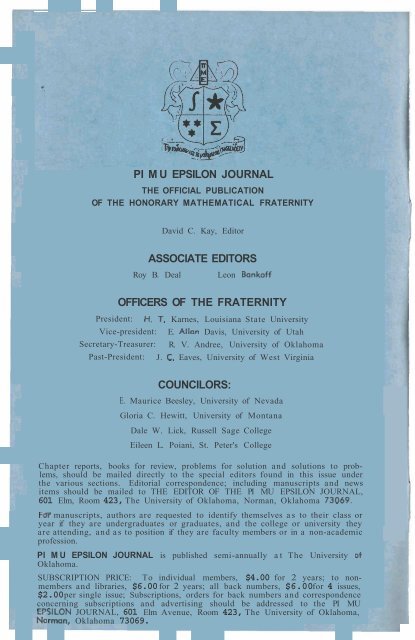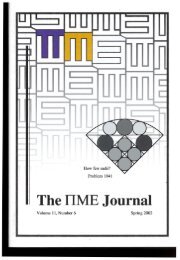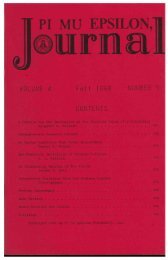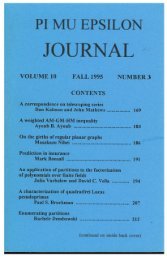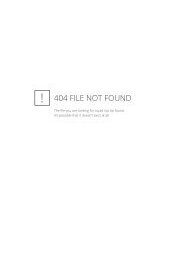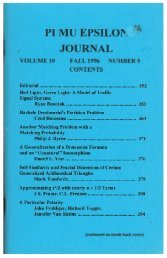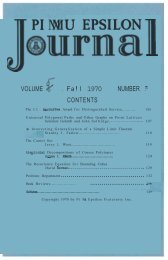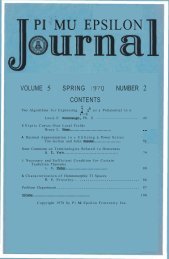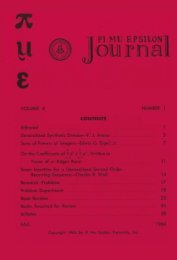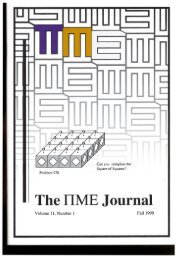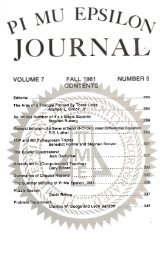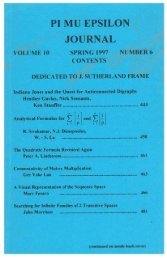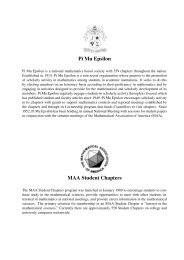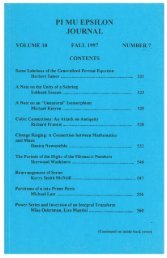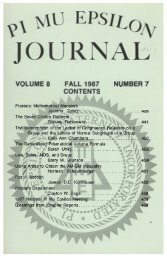You also want an ePaper? Increase the reach of your titles
YUMPU automatically turns print PDFs into web optimized ePapers that Google loves.
ELEMENTARY NUMBER THEORY IN CERTAINSUBSETS OF THE INTEGERS, IPI MU EPSILON JOURNALTHE OFFICIAL PUBLICATIONOF THE HONORARY MATHEMATICAL FRATERNITYDavid C. Kay, EditorASSOCIATE EDITORSRoy B. DealLeon BankoffOFFICERS OF THE FRATERNITYPresident: H. T. Karnes, Louisiana State UniversityVice-president: E. Allon Davis, University of UtahSecretary-Treasurer: R. V. Andree, University of OklahomaPast-President: J. C. Eaves, University of West VirginiaCOUNCILORS:E. Maurice Beesley, University of NevadaGloria C. Hewitt, University of MontanaDale W. Lick, Russell Sage CollegeEileen L. Poiani, St. Peter's CollegeChapter reports, books for review, problems for solution and solutions to problems,should be mailed directly to the special editors found in this issue underthe various sections. Editorial correspondence; including manuscripts and newsitems should be mailed to THE EDITOR OF THE PI MU EPSILON JOURNAL,601 Elm, Room 423, The University of Oklahoma, <strong>No</strong>rman, Oklahoma 73069.Far manuscripts, authors are requested to identify themselves as to their class oryear if they are undergraduates or graduates, and the college or university theyare attending, and as to position if they are faculty members or in a non-academicprofession.PI MU EPSILON JOURNAL is published semi-annually at The University ofOklahoma.SUBSCRIPTION PRICE: To individual members, $4.00 for 2 years; to nonmembersand libraries, $6.00 for 2 years; all back numbers, $6.00 for 4 issues,$2.00 per single issue; Subscriptions, orders for back numbers and correspondenceconcerning subscriptions and advertising should be addressed to the PI MU"SILON JOURNAL, 601 Elm Avenue, Room 423, The University of Oklahoma,rman. Oklahoma 73069.BIJ Cme.n 0. Adiio and Julian R. KoLodThe. Cotie-ge- 06 Saint ROACThe purpose of thi paper is to study some aspects ^f elementarynumber theory in certain subsets of ':, the set of integers.The moti-vation for this study came about from discussions in number theory textsindicating that the fundamental therrem of arithmetic does not hold insome ubsets of Z (see [l, p 281, [2, p 181, or [4, p 121). The usualexample given is 22, the multiples if 2, where "t is hown that 2, 6,and 18 are "prime" and that 36 = 6 6 = 2 - 18.In elemental", textbooks on algebra, divisibility i- usually rtudiedin an inregral domain (commu~arive ring with uniry and no zero divisors)and, as is well known, the fundamental theorem does nut always hi Id int h i ~ case eyther.The definitirn. are usually -tated for a commutativerizg and the main results usually hold in an integral domain.:n thispaper we make no such algebraic assumptions en the -ub et: con 'dered.The assumptions which are made are more or less forced by The facr Thai-we need TO limit he kinds of subsers of Z we wish ro consyder bur areweak enough ti allow a wide variety uf sets tv be taken into dnridcra-tion. However, our ma!n re-ults w'll be for the ring nZ, the multiplesof some integer n, n1. These results, however, do not hold becausecf the algebraic properties of nZ but because the primes; and i:omposites(as we shall define them) are so nicely distributed in these sets.The author? would like to thank the referee for hi? observationsand comments.1. PhtLw-inOJU.e,fiIn looking at nZ one immediately sees that this subset of Z isclosed under negation.To discuss divisibility in subsets of Z, thisis precisely the restriction we wish to place on the types of subsetswe are to consider (with the exception that we exclude the singletonset (0) ).Thus in this paper we only consider non-empty subsets A ofZ having the two properties: (a) A if (0) and (b) if x A, then -x f- A.


